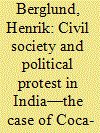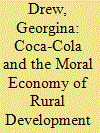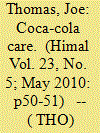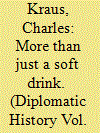| Srl | Item |
| 1 |
ID:
155045


|
|
|
|
|
| Summary/Abstract |
The Indian economic and political systems have recently opened up for increased foreign investments, which has resulted also in new forms of popular resistance. This article analyzes the campaign launched against the Coca-Cola-Company in Plachimada, Kerala, India, which in 2004 resulted in the closure of its bottling factory after accusations of water depletion and pollution. The analysis in the article is based on the theoretical concept “political opportunity” and concludes that the decision to close the plant was the result of an efficiently run popular campaign based on a tightly knit group of local activists, held together by a tribal identity. Vital for the success was also the help the group attracted by national and international civil society support groups and media, as well as the link between both media and civil society towards the political parties and the state.
|
|
|
|
|
|
|
|
|
|
|
|
|
|
|
|
| 2 |
ID:
179989


|
|
|
|
|
| Summary/Abstract |
This paper examines the knowledge-practices used by rural activists to raise public concerns about the use of water and land resources by a Coca-Cola bottling plant in Uttar Pradesh, India, between 2004 and 2014. These knowledge-practices included the use of semiotics and carefully crafted discourses—such as slogans and protest songs—to produce knowledge about villagers’ rights to rural subsistence and survival. An aim of this paper is to show the impressive ways in which the social movement persevered by building both public claims to a moral economy as well as village-level practices and institutions that helped to enact visions of what a moral economy could or should be. Of particular significance were activists’ efforts to frame rural water extraction and water rights through a subsistence-focused morality of rural development. This moral economy underscores villager-articulated desires for beneficial forms of economic activity that support rural livelihoods rather than prioritising environmentally destructive corporate activities.
|
|
|
|
|
|
|
|
|
|
|
|
|
|
|
|
| 3 |
ID:
097666


|
|
|
| 4 |
ID:
164275


|
|
|
|
|
| Summary/Abstract |
The beverage and cultural icon known as Coca-Cola returned to the People’s Republic of China (PRC) in January 1979. The month prior, the Coca-Cola Company and the Chinese government had brokered a bombshell agreement, which ended a thirty-year ban on the beverage on the Chinese mainland.1 Bringing the world’s most popular soft drink back to the world’s most populous country, the deal appeared telling of the positive state of Sino-American relations and China’s political and economic trajectory.2 The two countries had just formally established diplomatic relations and were intent on further consolidating ties, while Deng Xiaoping, having risen to preeminence within the Chinese Communist Party (CCP), was rolling out much needed reforms for his country’s economy.
|
|
|
|
|
|
|
|
|
|
|
|
|
|
|
|